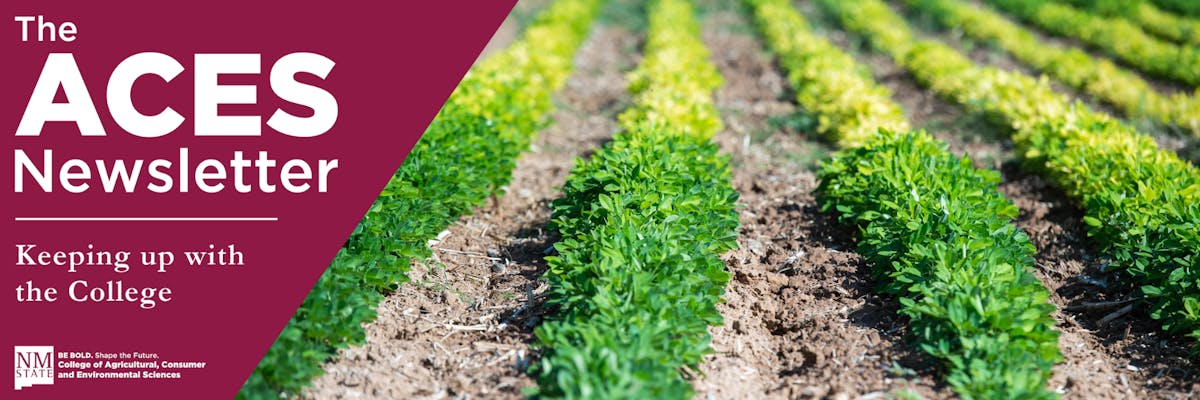 |
A MESSAGE FROM OUR DEAN Dear Friends of the College of ACES and Alumni, At the beginning of this month, we had the pleasure of hosting our 5th ACES Open House. Although the weather wasn’t on our side, the event was a huge success thanks to incredible organization and enthusiastic participation. Faculty, staff, and students came together to welcome more than 500 visitors from the community, sharing the impactful work we do at the College of ACES—from how we do it, to the results we achieve, and the lives we impact. I’m extremely proud of the effort and passion shown by our undergraduate and graduate students. Their research posters and hands-on activities highlighted the innovative and meaningful work taking place throughout the college and across NMSU. Adding to the vibrant atmosphere, NMSU’s Ballet Folklorico and Mariachi band brought energy, culture, and great music to the event. Their performances truly lit up the day and reminded us of the importance of celebrating our heritage and diversity. I want to express my heartfelt thanks to the organizing committee and the many faculty and staff who helped make this event possible. Your dedication is what keeps the spirit of ACES alive and thriving. In this newsletter, you’ll find highlights of the many activities happening across the college. While they may not always receive the spotlight they deserve, these efforts reflect the depth and breadth of what we accomplish together. Our college has more than 1,000 employees – including faculty, staff, and student employees – who work with great dedication to fulfill the mission of the college, which is to be an engine for economic and community development in New Mexico, improving the lives of New Mexicans through academic, research, and Extension programs. Events like the Open House give us a chance to showcase the integration of our three core functions—academics, research, and Extension. The booths, especially those led by our science centers, Extension professionals, and academics programs, are a testament to the collaborative, mission-driven work we do every day. Thank you all again for your outstanding hard work. GO AGGIES! |
A MESSAGE FROM OUR DEAN Dear Friends of the College of ACES and Alumni, At the beginning of this month, we had the pleasure of hosting our 5th ACES Open House. Although the weather wasn’t on our side, the event was a huge success thanks to incredible organization and enthusiastic participation. Faculty, staff, and students came together to welcome more than 500 visitors from the community, sharing the impactful work we do at the College of ACES—from how we do it, to the results we achieve, and the lives we impact. I’m extremely proud of the effort and passion shown by our undergraduate and graduate students. Their research posters and hands-on activities highlighted the innovative and meaningful work taking place throughout the college and across NMSU. Adding to the vibrant atmosphere, NMSU’s Ballet Folklorico and Mariachi band brought energy, culture, and great music to the event. Their performances truly lit up the day and reminded us of the importance of celebrating our heritage and diversity. I want to express my heartfelt thanks to the organizing committee and the many faculty and staff who helped make this event possible. Your dedication is what keeps the spirit of ACES alive and thriving. In this newsletter, you’ll find highlights of the many activities happening across the college. While they may not always receive the spotlight they deserve, these efforts reflect the depth and breadth of what we accomplish together. Our college has more than 1,000 employees – including faculty, staff, and student employees – who work with great dedication to fulfill the mission of the college, which is to be an engine for economic and community development in New Mexico, improving the lives of New Mexicans through academic, research, and Extension programs. Events like the Open House give us a chance to showcase the integration of our three core functions—academics, research, and Extension. The booths, especially those led by our science centers, Extension professionals, and academics programs, are a testament to the collaborative, mission-driven work we do every day. Thank you all again for your outstanding hard work. GO AGGIES! |
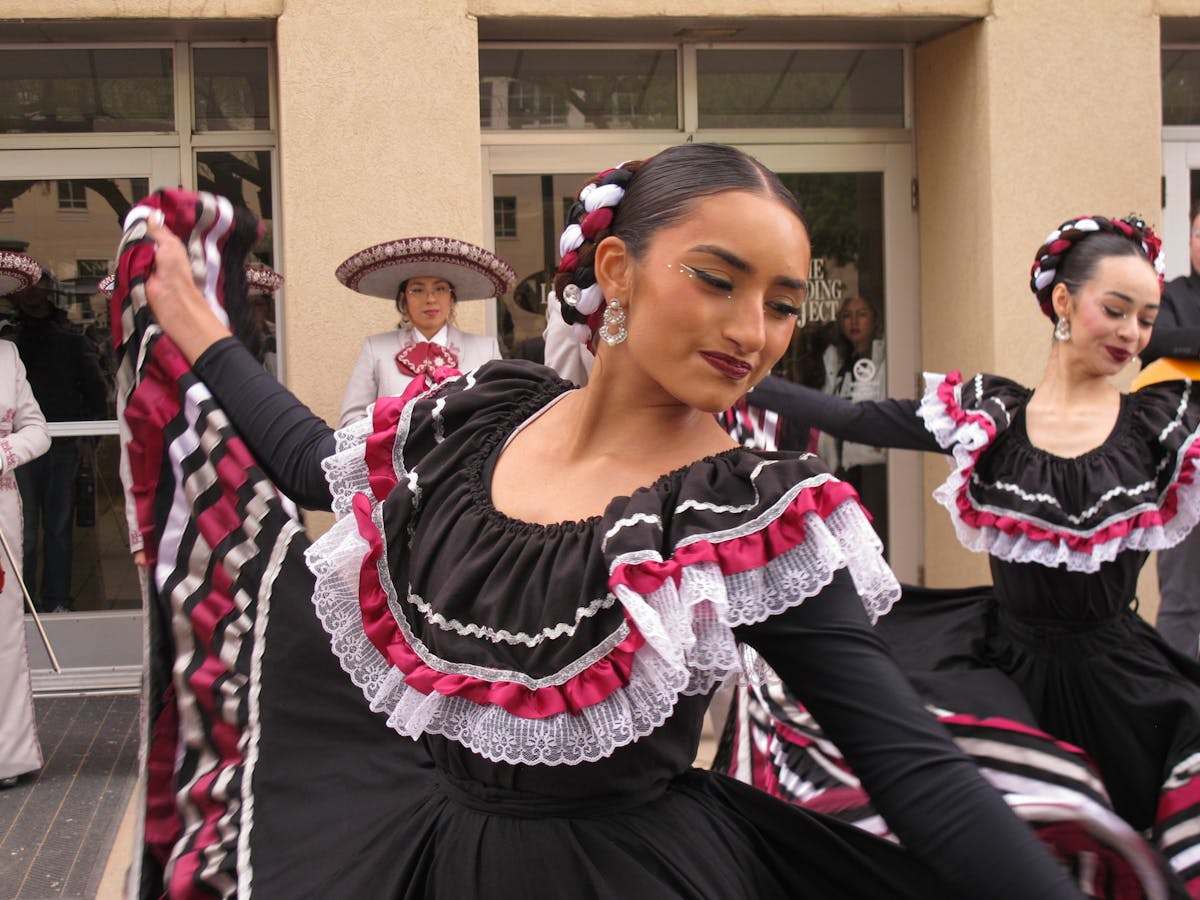 |
Rolando A. Flores Galarza Dean & Chief Administrative Officer |
Rolando A. Flores Galarza Dean & Chief Administrative Officer |
 |
ACES Academic Programs Office and NMDA Host Annual FFA Fest and BBQ On the first week of April, the NMSU campus welcomed nearly 1,400 students from across New Mexico for the annual FFA Career Development Events (CDEs). In conjunction with the competition, the ACES Academic Programs Office partnered with the New Mexico Department of Agriculture (NMDA) to host its signature FFA Fest and BBQ, creating a welcoming atmosphere for visiting students and teachers. The street festival featured over 20 organizations, including NMSU Admissions, the Rodeo Team, ACES academic departments, and student clubs—all highlighting the wide range of academic and extracurricular opportunities available through the College of ACES. The BBQ, made possible through the support of NMDA, was a standout feature of the event, serving more than 875 attendees. The event was a true celebration of ACES hospitality, NMSU pride, and the ongoing partnership between FFA, NMDA, and the college. |
ACES Academic Programs Office and NMDA Host Annual FFA Fest and BBQ On the first week of April, the NMSU campus welcomed nearly 1,400 students from across New Mexico for the annual FFA Career Development Events (CDEs). In conjunction with the competition, the ACES Academic Programs Office partnered with the New Mexico Department of Agriculture (NMDA) to host its signature FFA Fest and BBQ, creating a welcoming atmosphere for visiting students and teachers. The street festival featured over 20 organizations, including NMSU Admissions, the Rodeo Team, ACES academic departments, and student clubs—all highlighting the wide range of academic and extracurricular opportunities available through the College of ACES. The BBQ, made possible through the support of NMDA, was a standout feature of the event, serving more than 875 attendees. The event was a true celebration of ACES hospitality, NMSU pride, and the ongoing partnership between FFA, NMDA, and the college. |
AGRICULTURAL EXPERIMENT STATION |
AGRICULTURAL EXPERIMENT STATION |
|
|
Fabian Garcia Science Center and Jornada Experimental Range Collaborative Research The Fabian Garcia Science Center, located in Las Cruces, New Mexico, has started a four-month research project partnering with the USDA-ARS and the NMSU Jornada Experimental Range on grass recovery in degraded soils – soil seed bank and composted manure integration trials. The project's focus is to survey and determine the soil seed bank composition of 24 degraded, shrub-invaded, sandy to deep sand ecological sites at the NMSU Jornada Experimental Range. The study will incorporate seeding and manure integration that are conducive to grass establishment in sampled ecological sites. Researchers will also distinguish grass species with the greatest establishment rate and restoration potential and identify changes in soil chemical and physical parameters based on composted-manure integration rate. In addition, this study will measure and monitor volumetric water content fluxes across treatments and determine plant growth response (seeded and seed bank derived) to composted-manure treatments. This study will eventually identify the impact of composted-manure integration rate on plant germination. For more information, contact Communications and Reporting Director Claire Montoya at ccortner@nmsu.edu. |
Fabian Garcia Science Center and Jornada Experimental Range Collaborative Research The Fabian Garcia Science Center, located in Las Cruces, New Mexico, has started a four-month research project partnering with the USDA-ARS and the NMSU Jornada Experimental Range on grass recovery in degraded soils – soil seed bank and composted manure integration trials. The project's focus is to survey and determine the soil seed bank composition of 24 degraded, shrub-invaded, sandy to deep sand ecological sites at the NMSU Jornada Experimental Range. The study will incorporate seeding and manure integration that are conducive to grass establishment in sampled ecological sites. Researchers will also distinguish grass species with the greatest establishment rate and restoration potential and identify changes in soil chemical and physical parameters based on composted-manure integration rate. In addition, this study will measure and monitor volumetric water content fluxes across treatments and determine plant growth response (seeded and seed bank derived) to composted-manure treatments. This study will eventually identify the impact of composted-manure integration rate on plant germination. For more information, contact Communications and Reporting Director Claire Montoya at ccortner@nmsu.edu. |
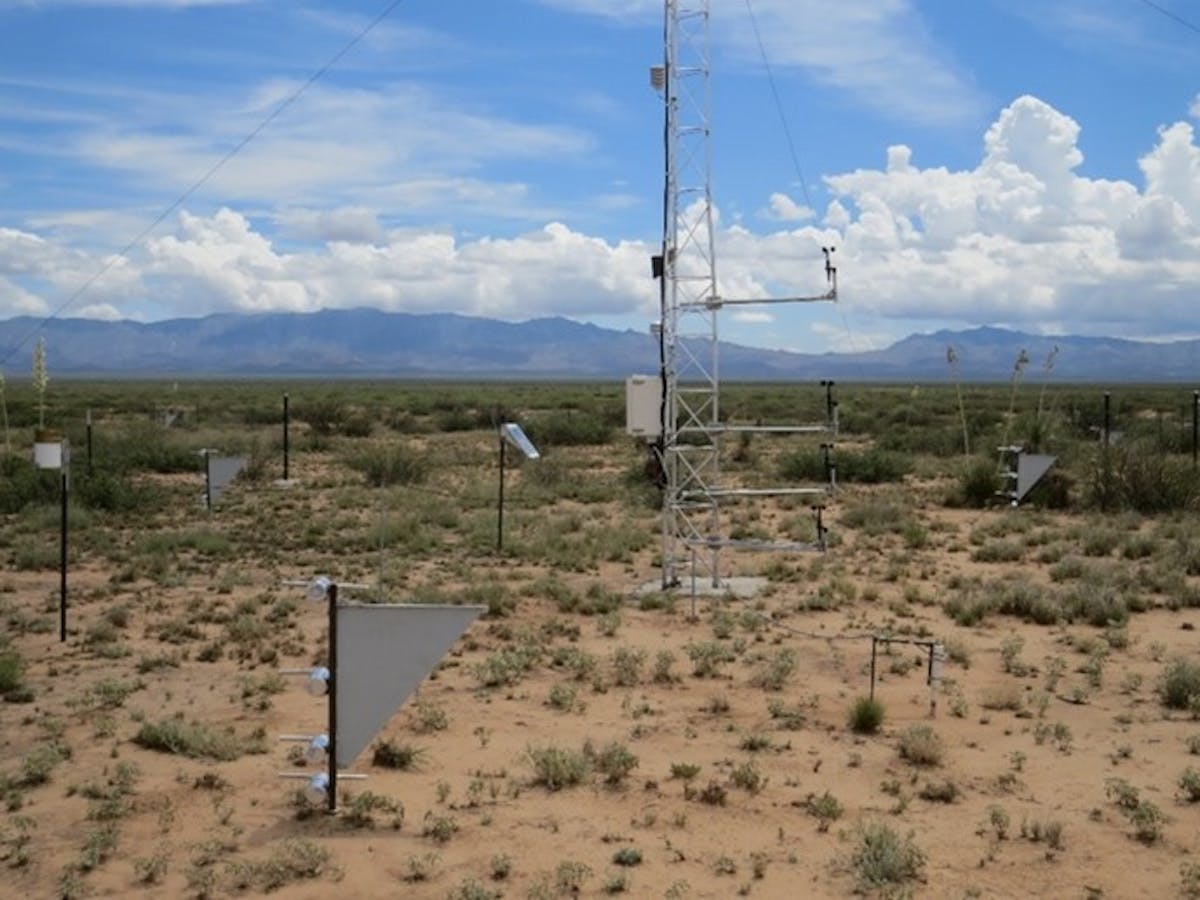 |
40th Annual International Stockmen’s Educational Foundation International Livestock Congress – Houston Livestock Show and Rodeo, Houston, TX On March 4-5, members of the Department of Animal and Range Sciences represented New Mexico State University at the 40th annual International Livestock Congress (ILC) in Houston, Texas. Associate Professor Dr. John Campbell and PhD student Katy Jo Richardson attended this year’s program, entitled “Effectively communicating sound science and the value of animal agriculture to society”, where they learned the importance and value of connecting with individuals from all walks of life in order to educate and advocate for animal agriculture production. This year, Katy Jo was one of 22 students selected as an ILC Student Fellow. As a part of the International Stockmen’s Educational Foundation, the ILC offers a competitive and highly coveted Student Fellowship Program, providing a limited number of domestic and international students the unique opportunity to not only attend the ILC, but also to train and network with program speakers and leaders within the animal agriculture industry. Applications for the ILC Student Fellowship Award are evaluated based on academic merit, leadership ability, and the applicant’s role in advancing the agriculture industry. Since the first ILC in 1986, more than 2,000 academic and industry leaders and stockmen have attended the congress, representing 40 states and 30 countries, making ILC one of the most diverse, global livestock venues in the world. The ILC educational program is designed each year to address issues of controversy, concern, and/or relevance to the beef industry at that time. World-renowned speakers address these topics, and the attendees are able to have their voices heard during lively panel discussions. Congratulations to Katy Jo and Dr. Campbell and Go Aggies! |
40th Annual International Stockmen’s Educational Foundation International Livestock Congress – Houston Livestock Show and Rodeo, Houston, TX On March 4-5, members of the Department of Animal and Range Sciences represented New Mexico State University at the 40th annual International Livestock Congress (ILC) in Houston, Texas. Associate Professor Dr. John Campbell and PhD student Katy Jo Richardson attended this year’s program, entitled “Effectively communicating sound science and the value of animal agriculture to society”, where they learned the importance and value of connecting with individuals from all walks of life in order to educate and advocate for animal agriculture production. This year, Katy Jo was one of 22 students selected as an ILC Student Fellow. As a part of the International Stockmen’s Educational Foundation, the ILC offers a competitive and highly coveted Student Fellowship Program, providing a limited number of domestic and international students the unique opportunity to not only attend the ILC, but also to train and network with program speakers and leaders within the animal agriculture industry. Applications for the ILC Student Fellowship Award are evaluated based on academic merit, leadership ability, and the applicant’s role in advancing the agriculture industry. Since the first ILC in 1986, more than 2,000 academic and industry leaders and stockmen have attended the congress, representing 40 states and 30 countries, making ILC one of the most diverse, global livestock venues in the world. The ILC educational program is designed each year to address issues of controversy, concern, and/or relevance to the beef industry at that time. World-renowned speakers address these topics, and the attendees are able to have their voices heard during lively panel discussions. Congratulations to Katy Jo and Dr. Campbell and Go Aggies! |
|
|
Sylvia “Gaby” Phillips, MS, RDN, LD, ACES college assistant professor and dietetic internship director at New Mexico State University (NMSU), has been recognized in the 16th annual TD10 showcase by Today's Dietitian magazine. This prestigious recognition highlights 10 registered dietitians who have made significant contributions to the field, underscoring the award's prestige and its role in acknowledging excellence within dietetics. Today's Dietitian. Phillips' innovative approach during the COVID-19 pandemic exemplifies her commitment to advancing dietetics education. Anticipating the need for adaptable learning environments, she spearheaded the development of New Mexico's first virtual reality (VR) and simulation lab for dietetics. This initiative began with a grant aimed at expanding rural clinical sites; however, recognizing the challenges, Phillips pivoted to propose a simulation lab. Inspired by tech startups utilizing VR, she introduced VR mock patients with common nutrition diagnoses. After three years of dedicated work, these holographic VR case studies were implemented, proving invaluable when the pandemic disrupted traditional training methods. This innovation allowed students to continue their education uninterrupted, showcasing Phillips' foresight and dedication to bridging classroom learning with real-world experience. The Today's Dietitian TD10 award not only honors individual achievements but also emphasizes the importance of mentorship and innovation in dietetics. Phillips' work serves as an inspiring example of how educators can adapt and lead, ensuring the continuous advancement of the profession. |
Sylvia “Gaby” Phillips, MS, RDN, LD, ACES college assistant professor and dietetic internship director at New Mexico State University (NMSU), has been recognized in the 16th annual TD10 showcase by Today's Dietitian magazine. This prestigious recognition highlights 10 registered dietitians who have made significant contributions to the field, underscoring the award's prestige and its role in acknowledging excellence within dietetics. Today's Dietitian. Phillips' innovative approach during the COVID-19 pandemic exemplifies her commitment to advancing dietetics education. Anticipating the need for adaptable learning environments, she spearheaded the development of New Mexico's first virtual reality (VR) and simulation lab for dietetics. This initiative began with a grant aimed at expanding rural clinical sites; however, recognizing the challenges, Phillips pivoted to propose a simulation lab. Inspired by tech startups utilizing VR, she introduced VR mock patients with common nutrition diagnoses. After three years of dedicated work, these holographic VR case studies were implemented, proving invaluable when the pandemic disrupted traditional training methods. This innovation allowed students to continue their education uninterrupted, showcasing Phillips' foresight and dedication to bridging classroom learning with real-world experience. The Today's Dietitian TD10 award not only honors individual achievements but also emphasizes the importance of mentorship and innovation in dietetics. Phillips' work serves as an inspiring example of how educators can adapt and lead, ensuring the continuous advancement of the profession. |
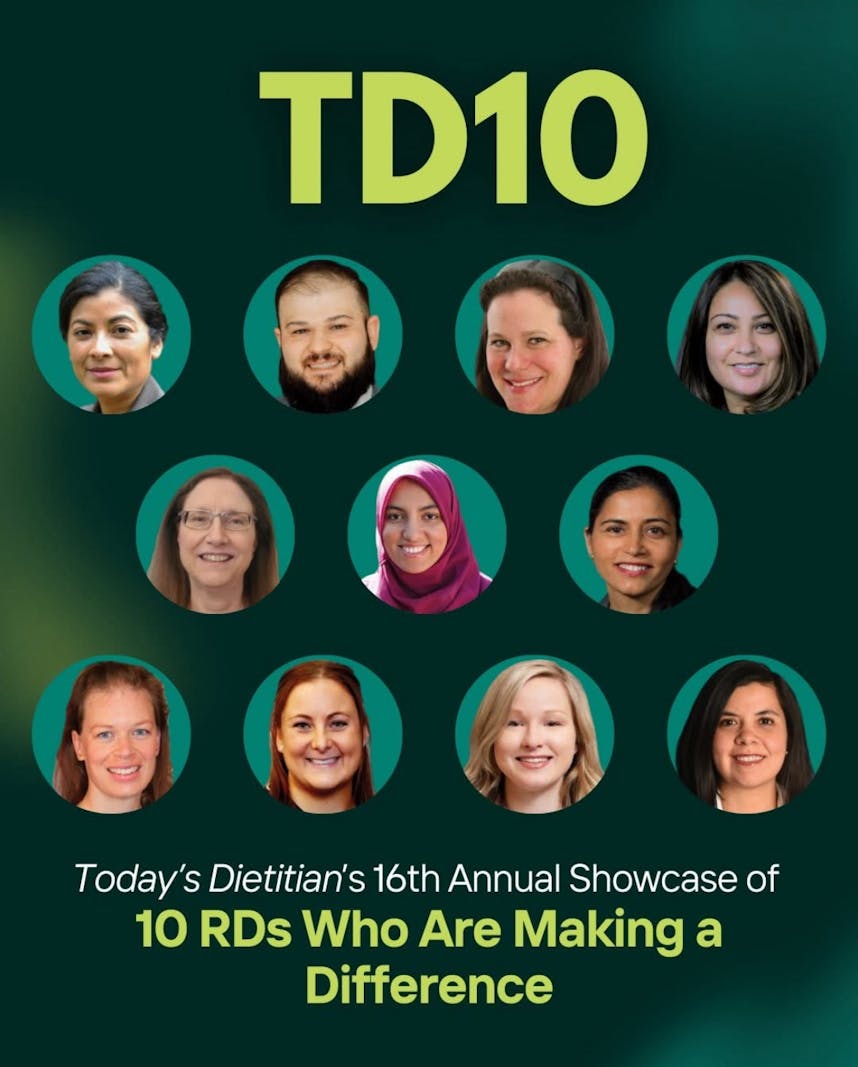 |
ENTOMOLOGY, PLANT PATHOLOGY AND WEED SCIENCE |
ENTOMOLOGY, PLANT PATHOLOGY AND WEED SCIENCE |
ACES entomology students shine at regional conference The Southwestern Branch of the Entomological Society of America held its 73rd annual conference in Round Rock, TX. The conference hosted more than 200 attendees from Texas, Oklahoma, New Mexico and Mexico. Graduate students from Entomology, Plant Pathology, and Weed Science and Plant and Environmental Sciences shared their research efforts through talks and posters and competed in the entomology games (trivia bowl competition). Isha Magar, master's student of Dr. Kristen Bowers, won second-place talk describing the effects of insect growth regulators on Turkestan cockroaches, which have become problematic in New Mexico. It is noteworthy that Ms. Magar also won first place for her graduate student poster presented at ACES Open House. Agricultural Biology graduate student Eva Carabotta won first prize in the entomology photo competition in the Arthropods in Action category, for her photograph displaying a spider spinning a larva in its web. For more information, contact Dr. Ricardo Ramirez at ricarami@nmsu.edu. |
ACES entomology students shine at regional conference The Southwestern Branch of the Entomological Society of America held its 73rd annual conference in Round Rock, TX. The conference hosted more than 200 attendees from Texas, Oklahoma, New Mexico and Mexico. Graduate students from Entomology, Plant Pathology, and Weed Science and Plant and Environmental Sciences shared their research efforts through talks and posters and competed in the entomology games (trivia bowl competition). Isha Magar, master's student of Dr. Kristen Bowers, won second-place talk describing the effects of insect growth regulators on Turkestan cockroaches, which have become problematic in New Mexico. It is noteworthy that Ms. Magar also won first place for her graduate student poster presented at ACES Open House. Agricultural Biology graduate student Eva Carabotta won first prize in the entomology photo competition in the Arthropods in Action category, for her photograph displaying a spider spinning a larva in its web. For more information, contact Dr. Ricardo Ramirez at ricarami@nmsu.edu. |
|
|
NMSU was well represented by graduate students and faculty from EPPWS, PES, and Biology. From left to right, Graduate Students: John Agnew, Kamaile DeLong, Kavita Adhikari, Sara Parra-Perez, Luis Ochoa-Cadena, Eva Carabotta, Isha Magar, April Lopez, Gabriel Borg, and Anjali Karki. Faculty: Drs. Ricardo Ramirez, Scott Bundy, Kristen Bowers, Joanie King, and Immo Hanson. |
NMSU was well represented by graduate students and faculty from EPPWS, PES, and Biology. From left to right, Graduate Students: John Agnew, Kamaile DeLong, Kavita Adhikari, Sara Parra-Perez, Luis Ochoa-Cadena, Eva Carabotta, Isha Magar, April Lopez, Gabriel Borg, and Anjali Karki. Faculty: Drs. Ricardo Ramirez, Scott Bundy, Kristen Bowers, Joanie King, and Immo Hanson. |
| Congratulations to Isha Magar for her 2nd-place talk in the MS student category and to advisor Dr. Kristen Bowers. |
Congratulations to Isha Magar for her 2nd-place talk in the MS student category and to advisor Dr. Kristen Bowers. |
|
|
EXTENSION HEALTH & WELLBEING |
EXTENSION HEALTH & WELLBEING |
On average, a person will spend approximately one-third of their life working, so it is beneficial for individuals and organizations to create a workplace where employees thrive rather than just survive. Dr. Laura Bittner, Extension Health and Wellbeing Specialist, and Dr. Karim Martinez, Extension Family Life Specialist, in the Family and Consumer Sciences Department, recently returned from presenting at the 2025 National Extension and Research Administrative Officers Conference (NERAOC) in Reno, Nevada. The presentation, titled Inspire and Include: Strategies for a Thriving Workplace, introduced participants to characteristics of thriving organizational environments; identified strategies for improving communication, connection and collaboration; explored the role of leadership and personal accountability; and shared techniques for motivating and encouraging colleagues. This is the third year Dr. Bittner and Dr. Martinez have been invited to present at the national conference. Fifty-two participants representing 20 land grant universities attended the presentation. To schedule a training or presentation, contact Laura Bittner (lbittner@nmsu.edu) or Karim Martinez (karmarti@nmsu.edu). |
On average, a person will spend approximately one-third of their life working, so it is beneficial for individuals and organizations to create a workplace where employees thrive rather than just survive. Dr. Laura Bittner, Extension Health and Wellbeing Specialist, and Dr. Karim Martinez, Extension Family Life Specialist, in the Family and Consumer Sciences Department, recently returned from presenting at the 2025 National Extension and Research Administrative Officers Conference (NERAOC) in Reno, Nevada. The presentation, titled Inspire and Include: Strategies for a Thriving Workplace, introduced participants to characteristics of thriving organizational environments; identified strategies for improving communication, connection and collaboration; explored the role of leadership and personal accountability; and shared techniques for motivating and encouraging colleagues. This is the third year Dr. Bittner and Dr. Martinez have been invited to present at the national conference. Fifty-two participants representing 20 land grant universities attended the presentation. To schedule a training or presentation, contact Laura Bittner (lbittner@nmsu.edu) or Karim Martinez (karmarti@nmsu.edu). |
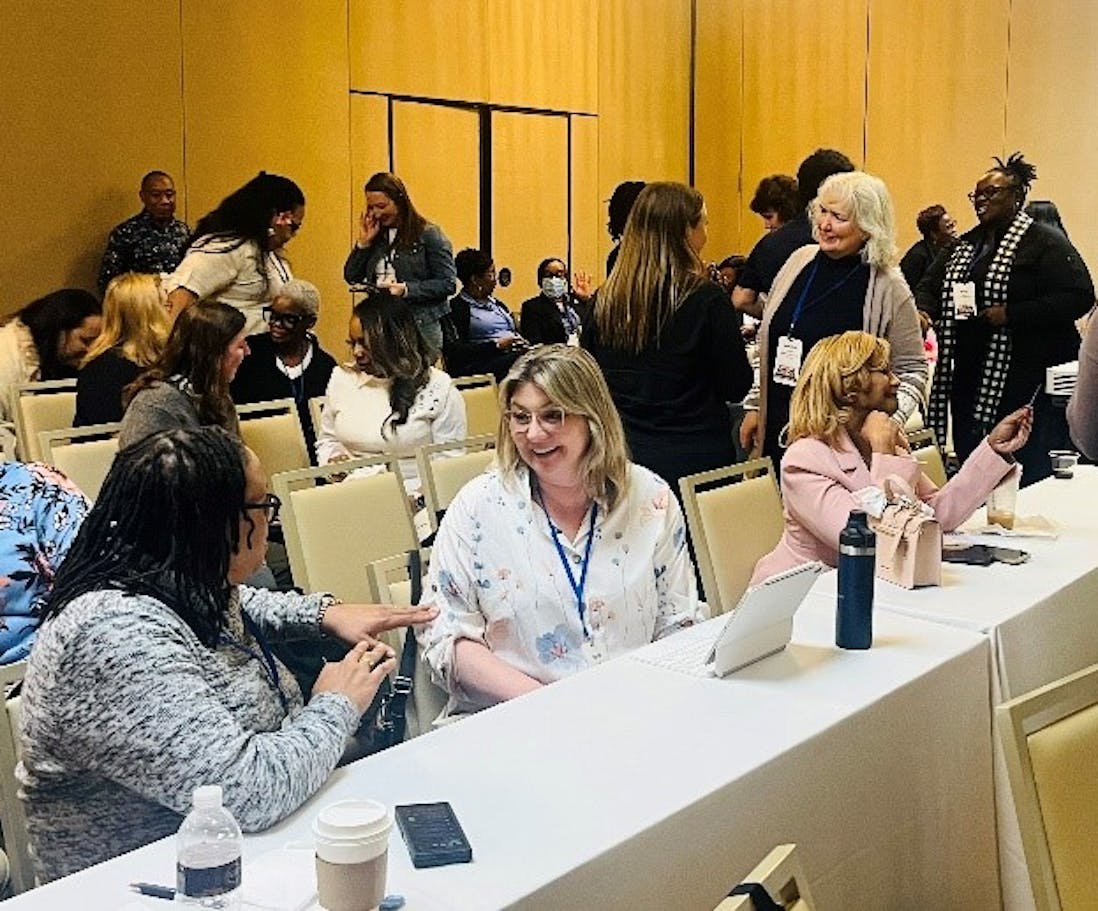 |
FAMILY & CONSUMER SCIENCES |
FAMILY & CONSUMER SCIENCES |
The New Mexico Association of Family and Consumer Sciences (NMAFCS) presented before the Fifty-Seventh Legislature's First Session in January. During this session, the New Mexico State Senate formally recognized and commended the field for its exceptional contributions to the state. The Senate highlighted the profession's crucial role in supporting individuals, families, and communities by promoting healthy, successful lives through education, research, and the use of innovative technologies. |
The New Mexico Association of Family and Consumer Sciences (NMAFCS) presented before the Fifty-Seventh Legislature's First Session in January. During this session, the New Mexico State Senate formally recognized and commended the field for its exceptional contributions to the state. The Senate highlighted the profession's crucial role in supporting individuals, families, and communities by promoting healthy, successful lives through education, research, and the use of innovative technologies. |
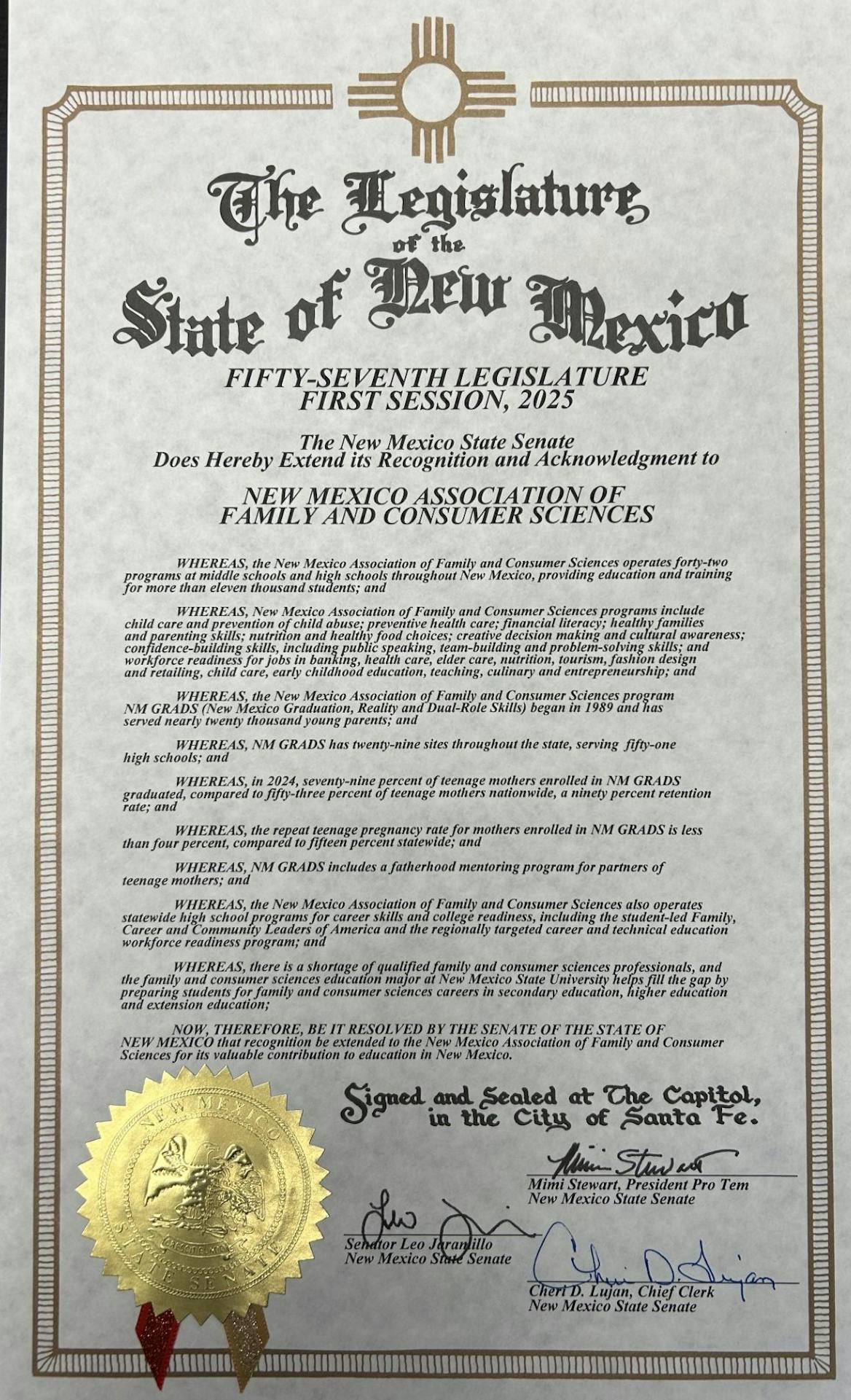 |
The Family and Consumer Sciences Education (FCSE) program recently hosted its annual FCS Educator Meeting during the ACES Open House, themed “League of Leadership,” celebrating educators as superheroes. The event highlighted the introduction of Holly Smith, the 2025 FCS Outstanding Teacher, who shared valuable insights and connected with attendees. Also honored were future educators Suzanna and Michael from Centennial High School, recognized at the State FCCLA Leadership Conference for their active involvement in the “Say Yes to FCS” initiative. Both students plan to begin the FCSE program this fall, reflecting the growing interest in careers in FCS education. This annual event plays a vital role in fostering professional relationships, celebrating current and future leaders in the field, and strengthening the sense of community within FCS. It offers an inspiring platform to recognize achievements, share experiences, and support the continued growth and impact of Family and Consumer Sciences Education. For more information, contact Dr. Jamie Molina at jamimoli@nmsu.edu |
The Family and Consumer Sciences Education (FCSE) program recently hosted its annual FCS Educator Meeting during the ACES Open House, themed “League of Leadership,” celebrating educators as superheroes. The event highlighted the introduction of Holly Smith, the 2025 FCS Outstanding Teacher, who shared valuable insights and connected with attendees. Also honored were future educators Suzanna and Michael from Centennial High School, recognized at the State FCCLA Leadership Conference for their active involvement in the “Say Yes to FCS” initiative. Both students plan to begin the FCSE program this fall, reflecting the growing interest in careers in FCS education. This annual event plays a vital role in fostering professional relationships, celebrating current and future leaders in the field, and strengthening the sense of community within FCS. It offers an inspiring platform to recognize achievements, share experiences, and support the continued growth and impact of Family and Consumer Sciences Education. For more information, contact Dr. Jamie Molina at jamimoli@nmsu.edu |
|
|
FASHION MERCHANDISING & DESIGN |
FASHION MERCHANDISING & DESIGN |
Earlier this year, Fashion Merchandising & Design students traveled to the National Retail Federation (NRF) Student Program 2025 in New York City. These fashion students were awarded NRF scholarships and travel stipends. This conference offered student access to leading company representatives and mentors in the fashion industry from around the world. - Daniela Caranco received the NRF Bright Futures scholarship award.
- Atlee Musgrave represented NMSU as our campus NRF Student Ambassador for 2024-25.
- Fernanda Mayorga received the NRF Foundation x CVS Health Retail Leaders Scholarship ($10,000 + a travel to NYC) award.
- Xavier Galindo received the Rising Stars Scholarship award.
The impact of this opportunity is varied but notable for the students' educational journeys. Atlee Musgrave (Senior), stated. “the thing that impacted me the most was being in space with people and other students who have the same goals, drive, and ambition that I do. It was incredible to be able to talk with industry leaders about their experiences, what they have learned from the experience, and what they are still learning from it.” Xavier Galindo (Junior) explained, “The retail industry is full of job opportunities that develop leaders. New methods, such as the integration of AI and sustainable practices, are advancing at a rapid pace. The AI segment of the conference made me reflect on how I could use it in the future to create or enhance my designs as a fashion designer.” Fernanda Mayorga (Senior) suggests, “After listening [to] industry leaders I understood just how much adaptability, innovation, strategy and technology are necessary to build a successful retailer.” Also, “While I understand that everyone has a certain pace of where they want to be in their career, I felt that talking with other students gave me a humbling perspective of what it means to be in a competitive field.” Daniela Carranco, offered that “be creative….satisfying your consumers is a big lesson everyone in the retail industry must know and don’t be afraid of being out of the ordinary because those customers will remember and come back to you.” Dr. Insook Ahn, Professor of Design, traveled with the students. |
Earlier this year, Fashion Merchandising & Design students traveled to the National Retail Federation (NRF) Student Program 2025 in New York City. These fashion students were awarded NRF scholarships and travel stipends. This conference offered student access to leading company representatives and mentors in the fashion industry from around the world. - Daniela Caranco received the NRF Bright Futures scholarship award.
- Atlee Musgrave represented NMSU as our campus NRF Student Ambassador for 2024-25.
- Fernanda Mayorga received the NRF Foundation x CVS Health Retail Leaders Scholarship ($10,000 + a travel to NYC) award.
- Xavier Galindo received the Rising Stars Scholarship award.
The impact of this opportunity is varied but notable for the students' educational journeys. Atlee Musgrave (Senior), stated. “the thing that impacted me the most was being in space with people and other students who have the same goals, drive, and ambition that I do. It was incredible to be able to talk with industry leaders about their experiences, what they have learned from the experience, and what they are still learning from it.” Xavier Galindo (Junior) explained, “The retail industry is full of job opportunities that develop leaders. New methods, such as the integration of AI and sustainable practices, are advancing at a rapid pace. The AI segment of the conference made me reflect on how I could use it in the future to create or enhance my designs as a fashion designer.” Fernanda Mayorga (Senior) suggests, “After listening [to] industry leaders I understood just how much adaptability, innovation, strategy and technology are necessary to build a successful retailer.” Also, “While I understand that everyone has a certain pace of where they want to be in their career, I felt that talking with other students gave me a humbling perspective of what it means to be in a competitive field.” Daniela Carranco, offered that “be creative….satisfying your consumers is a big lesson everyone in the retail industry must know and don’t be afraid of being out of the ordinary because those customers will remember and come back to you.” Dr. Insook Ahn, Professor of Design, traveled with the students. |
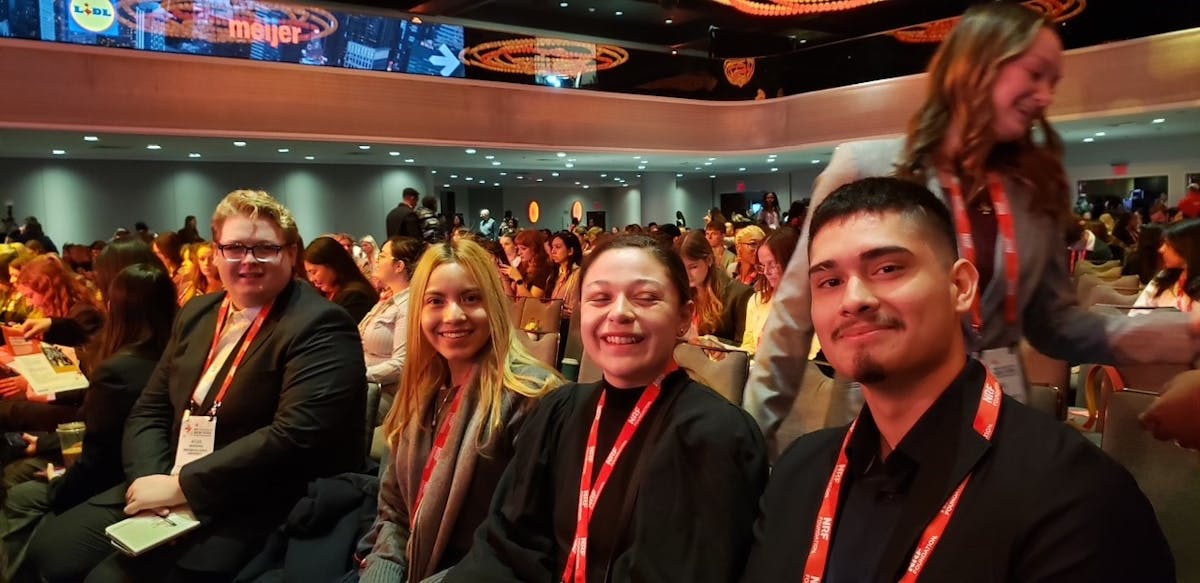 |
INNOVATIVE MEDIA RESEARCH & EXTENSION |
INNOVATIVE MEDIA RESEARCH & EXTENSION |
New Web Interactive Trains Processors in Small Commercial Kitchens in Food Safety Processing facilities and commercial incubator kitchens help entrepreneurs reach new markets for value-added products. These processors usually know their products well, but they often need resources on food safety, such as materials for training employees, and advice on how to evaluate risks in these types of facilities. A new web tool, iTIPS: Food Safety, provides interactive tools in English and Spanish to improve the practice of food safety in small processing facilities. This module allows users to navigate through a food processing facility that demonstrates best practices in food safety. Users explore the Breakroom, the Food Processing Floor, the Warehouse and Distribution area, and Facilities & Grounds. As they interact with workers in each section, users learn about essential practices and can test their knowledge through a quiz. Shared through local food conferences, public health meetings, and in shared-use kitchens, the interactive module has led to measured change in knowledge. (Data is being prepared for publication.) Matheus Cezarotto, PhD, Assistant Professor and Extension Specialist, Educational Technology, led the design process in collaboration with a team of multi-state food safety extension specialists. Collaborators explored content priorities together, identified audience needs using research data, articulated intended educational changes for users, and planned educational activities to foster this change. The tool was produced by the Department of Innovative Media Research and Extension in collaboration with Nancy Flores (now retired), former NMSU Extension food safety specialist and in collaboration with the University of Massachusetts and Iowa State University as part of research supported by the National Institute of Food Agriculture, U.S. Department of Agriculture Food Safety Outreach Program award number 2021-0654-1027178. |
New Web Interactive Trains Processors in Small Commercial Kitchens in Food Safety Processing facilities and commercial incubator kitchens help entrepreneurs reach new markets for value-added products. These processors usually know their products well, but they often need resources on food safety, such as materials for training employees, and advice on how to evaluate risks in these types of facilities. A new web tool, iTIPS: Food Safety, provides interactive tools in English and Spanish to improve the practice of food safety in small processing facilities. This module allows users to navigate through a food processing facility that demonstrates best practices in food safety. Users explore the Breakroom, the Food Processing Floor, the Warehouse and Distribution area, and Facilities & Grounds. As they interact with workers in each section, users learn about essential practices and can test their knowledge through a quiz. Shared through local food conferences, public health meetings, and in shared-use kitchens, the interactive module has led to measured change in knowledge. (Data is being prepared for publication.) Matheus Cezarotto, PhD, Assistant Professor and Extension Specialist, Educational Technology, led the design process in collaboration with a team of multi-state food safety extension specialists. Collaborators explored content priorities together, identified audience needs using research data, articulated intended educational changes for users, and planned educational activities to foster this change. The tool was produced by the Department of Innovative Media Research and Extension in collaboration with Nancy Flores (now retired), former NMSU Extension food safety specialist and in collaboration with the University of Massachusetts and Iowa State University as part of research supported by the National Institute of Food Agriculture, U.S. Department of Agriculture Food Safety Outreach Program award number 2021-0654-1027178. |
 |
PLANT & ENVIRONMENTAL SCIENCES EXTENSION PLANT & SCIENCES |
PLANT & ENVIRONMENTAL SCIENCES EXTENSION PLANT & SCIENCES |
The department of Plant and Environmental Sciences and Extension Plant Sciences are happy and excited to announce that there are a few scientists/faculty members who have started recently in the departments. They have diverse knowledge, skills, and experience that benefit the department towards contributing to Departments and ACES college missions. |
The department of Plant and Environmental Sciences and Extension Plant Sciences are happy and excited to announce that there are a few scientists/faculty members who have started recently in the departments. They have diverse knowledge, skills, and experience that benefit the department towards contributing to Departments and ACES college missions. |
|
|
| Dr. Srijana Dura is the newly hired Plant Diagnostician and Program manager of the Plant Diagnostic Clinic in Extension Plant Sciences at New Mexico State University Plant Diagnostic Clinic working under the guidance of Dr. Anowar Islam (Department Head) and Dr. Leslie Beck (Plant Clinic Director). Srijana joined NMSU in 2015 for her master’s degree and continued to finish her Ph.D. degree from Plant and Environmental Sciences under the guidance of Dr. Soum Sanogo and Dr. Ivette Guzman in 2022 with a plant pathology focus. Upon graduation, she worked as a post-doc in Dr. Steve Hanson’s lab for one and a half years. Her Ph.D. program and post-doctoral program focused on the identification and management of chile diseases. She has almost 10 years of experience working on soil borne diseases and their management in field and greenhouse conditions. She also has experience working in Extension and with local growers helping them manage different plant diseases. In the past, working as president for different organizations and a lead teaching assistant for different courses has provided additional leadership experience. Currently, she is managing the Plant Diagnostic Clinic and is involved in some applied based research with Dr. Phillip Lujan and Dr. Steve Hanson focusing on management of soil borne disease using biological based methods. |
Dr. Srijana Dura is the newly hired Plant Diagnostician and Program manager of the Plant Diagnostic Clinic in Extension Plant Sciences at New Mexico State University Plant Diagnostic Clinic working under the guidance of Dr. Anowar Islam (Department Head) and Dr. Leslie Beck (Plant Clinic Director). Srijana joined NMSU in 2015 for her master’s degree and continued to finish her Ph.D. degree from Plant and Environmental Sciences under the guidance of Dr. Soum Sanogo and Dr. Ivette Guzman in 2022 with a plant pathology focus. Upon graduation, she worked as a post-doc in Dr. Steve Hanson’s lab for one and a half years. Her Ph.D. program and post-doctoral program focused on the identification and management of chile diseases. She has almost 10 years of experience working on soil borne diseases and their management in field and greenhouse conditions. She also has experience working in Extension and with local growers helping them manage different plant diseases. In the past, working as president for different organizations and a lead teaching assistant for different courses has provided additional leadership experience. Currently, she is managing the Plant Diagnostic Clinic and is involved in some applied based research with Dr. Phillip Lujan and Dr. Steve Hanson focusing on management of soil borne disease using biological based methods. |
|
|
Dr. Maria Chavez grew up in Carlsbad, NM and graduated from NMSU with a B.S. in Horticulture and Conservation Ecology. She studied dragonflies in the cranberry marshes of the Wisconsin Northwoods and received an M.S. in Entomology and Agroecology at UW Madison. Maria studied black soldier fly larvae frass and insects as food and feed with Dr. Jeff Tomberlin and received a Ph.D. in Ecology at CSU. During her postdoc at CSU Spur, she studied agrivoltaics, green infrastructure, and controlled environment agriculture with Drs. Jennifer Bousselot and Josh Craver. She started as an Assistant Professor of integrative renewable energy and agricultural natural resources at the NMSU ASC in Farmington on January 13, 2025. Maria is dedicated to building a research program that integrates renewable energy into agricultural production through a systems lens in order to best serve the surrounding tribal and rural communities. |
Dr. Maria Chavez grew up in Carlsbad, NM and graduated from NMSU with a B.S. in Horticulture and Conservation Ecology. She studied dragonflies in the cranberry marshes of the Wisconsin Northwoods and received an M.S. in Entomology and Agroecology at UW Madison. Maria studied black soldier fly larvae frass and insects as food and feed with Dr. Jeff Tomberlin and received a Ph.D. in Ecology at CSU. During her postdoc at CSU Spur, she studied agrivoltaics, green infrastructure, and controlled environment agriculture with Drs. Jennifer Bousselot and Josh Craver. She started as an Assistant Professor of integrative renewable energy and agricultural natural resources at the NMSU ASC in Farmington on January 13, 2025. Maria is dedicated to building a research program that integrates renewable energy into agricultural production through a systems lens in order to best serve the surrounding tribal and rural communities. |
| |
|
| Dr. Mohammad Abdullah Al Bari is a quantitative geneticist and plant breeder by training. He received his Ph.D. from North Dakota State University, Fargo, ND working with maize breeding and genetics. He served multiple institutions in different capacities in teaching and research and gained experience in multiple crops including maize, wheat, sorghum, and legumes in multiple domains including germplasm enhancement, inbred development, hybrid production, extensive trial management, and led multidisciplinary collaborative research. His proficiency spans analyzing association studies and implementing genomic and phenomic selections for crop improvement. Mohammad contributed to the development of deep learning and machine learning tools for yield forecasting. His efforts have attracted competitive grants and provided mentorship to 15 graduate students towards impactful careers in plant breeding. Mohammad’s research focuses on boosting breeding efficiency and enhancing cultivar development of Alfalfa and other forage crops for the resilience, productivity, and profitability through interdisciplinary research to serve New Mexico and Southwest growers and stakeholders. He plans to integrate traditional breeding techniques with cutting-edge tools to improve water-use efficiency, salinity tolerance, and resistance to diseases and pests, while advancing crop yield and forage quality. |
Dr. Mohammad Abdullah Al Bari is a quantitative geneticist and plant breeder by training. He received his Ph.D. from North Dakota State University, Fargo, ND working with maize breeding and genetics. He served multiple institutions in different capacities in teaching and research and gained experience in multiple crops including maize, wheat, sorghum, and legumes in multiple domains including germplasm enhancement, inbred development, hybrid production, extensive trial management, and led multidisciplinary collaborative research. His proficiency spans analyzing association studies and implementing genomic and phenomic selections for crop improvement. Mohammad contributed to the development of deep learning and machine learning tools for yield forecasting. His efforts have attracted competitive grants and provided mentorship to 15 graduate students towards impactful careers in plant breeding. Mohammad’s research focuses on boosting breeding efficiency and enhancing cultivar development of Alfalfa and other forage crops for the resilience, productivity, and profitability through interdisciplinary research to serve New Mexico and Southwest growers and stakeholders. He plans to integrate traditional breeding techniques with cutting-edge tools to improve water-use efficiency, salinity tolerance, and resistance to diseases and pests, while advancing crop yield and forage quality. |
|
|
Dr. Geraldine Diverres Naranjo grew up in the Canary Islands, Spain, and discovered her passion for the wine industry during an Applied Microbiology class in her senior year of college. After earning a Bachelor of Science in Biology, she pursued a Master of Science in Plant Biology and a Ph.D. in Horticulture, focusing on wine grapes as her model crop throughout her academic journey. Geraldine’s research has primarily focused on irrigation management in vineyards. She has investigated how irrigation dose and frequency with high-salinity water influence vineyard productivity. During her Ph.D., she expanded this work by investigating the effects of different irrigation methodologies on vine performance and the phenolic and aromatic compositions of the resulting wines. She also completed an internship in a consulting company that gave her the opportunity to travel across diverse viticultural regions in Spain and gain practical experience working directly with growers. Geraldine is excited to begin her next chapter in New Mexico to contribute to the state’s growing viticulture and enology industry. |
Dr. Geraldine Diverres Naranjo grew up in the Canary Islands, Spain, and discovered her passion for the wine industry during an Applied Microbiology class in her senior year of college. After earning a Bachelor of Science in Biology, she pursued a Master of Science in Plant Biology and a Ph.D. in Horticulture, focusing on wine grapes as her model crop throughout her academic journey. Geraldine’s research has primarily focused on irrigation management in vineyards. She has investigated how irrigation dose and frequency with high-salinity water influence vineyard productivity. During her Ph.D., she expanded this work by investigating the effects of different irrigation methodologies on vine performance and the phenolic and aromatic compositions of the resulting wines. She also completed an internship in a consulting company that gave her the opportunity to travel across diverse viticultural regions in Spain and gain practical experience working directly with growers. Geraldine is excited to begin her next chapter in New Mexico to contribute to the state’s growing viticulture and enology industry. |
| |
|
SCHOOL OF HOTEL, RESTAURANT & TOURISM MANAGEMENT |
SCHOOL OF HOTEL, RESTAURANT & TOURISM MANAGEMENT |
HRTM’s Chef Artist Dinner was a Great Success The School of Hotel, Restaurant and Tourism Management held its annual Guest Chef Artist Dinner on Thursday, March 27 at NMSU’s Corbett Center Ballroom. Two chefs whose culinary chops have landed them on the Food Network were the special chefs at this dinner fundraiser. Chef Marie Yniguez Yniguez owns and operates two Albuquerque restaurants, My Mom’s and Smoking Fred’s ’46. She has notched several appearances on Food Network shows like Chopped and Dinner, Drive-Ins and Dives, and was a 2022 semifinalist for best chef in the Southwest by the James Beard Foundation. Chef Mike White founded High Point Grill and Taproom in Albuquerque and serves as the director of two charities, 505 Food and Bar Fights and The Kitchen Kids Inc. He has received awards from the New Mexico Restaurant Association, Edible New Mexico and other organizations. They prepared the reception appetizers, salad, soup, and entrée. Chef Jon Young, New Mexico Department of Agriculture Chef Ambassador and chef for the New Mexico Beef Council, prepared the dessert. HRTM alumni Patrick Abalos and his team from Not Too Sweet, LLC and Swizzle Media created four specialty cocktails for the reception and an espresso cocktail paired with the dessert. Students in HRTM 4110 - Meetings, Convention and Special Events coordinated the event under the guidance of HRTM Chef-instructor Danielle Young. The event’s primary sponsor was Sodexo with support from Shamrock Foods, Republic National Distributing Company, Southern Glazer’s Wine and Spirits and over 20 donors of silent auction items. The event proceeds of over $16,000 benefit scholarships, travel, professional development and other program activities for our wonderful HRTM students. For more information, contact Dr. Jean Hertzman at jhertzma@nmsu.edu |
HRTM’s Chef Artist Dinner was a Great Success The School of Hotel, Restaurant and Tourism Management held its annual Guest Chef Artist Dinner on Thursday, March 27 at NMSU’s Corbett Center Ballroom. Two chefs whose culinary chops have landed them on the Food Network were the special chefs at this dinner fundraiser. Chef Marie Yniguez Yniguez owns and operates two Albuquerque restaurants, My Mom’s and Smoking Fred’s ’46. She has notched several appearances on Food Network shows like Chopped and Dinner, Drive-Ins and Dives, and was a 2022 semifinalist for best chef in the Southwest by the James Beard Foundation. Chef Mike White founded High Point Grill and Taproom in Albuquerque and serves as the director of two charities, 505 Food and Bar Fights and The Kitchen Kids Inc. He has received awards from the New Mexico Restaurant Association, Edible New Mexico and other organizations. They prepared the reception appetizers, salad, soup, and entrée. Chef Jon Young, New Mexico Department of Agriculture Chef Ambassador and chef for the New Mexico Beef Council, prepared the dessert. HRTM alumni Patrick Abalos and his team from Not Too Sweet, LLC and Swizzle Media created four specialty cocktails for the reception and an espresso cocktail paired with the dessert. Students in HRTM 4110 - Meetings, Convention and Special Events coordinated the event under the guidance of HRTM Chef-instructor Danielle Young. The event’s primary sponsor was Sodexo with support from Shamrock Foods, Republic National Distributing Company, Southern Glazer’s Wine and Spirits and over 20 donors of silent auction items. The event proceeds of over $16,000 benefit scholarships, travel, professional development and other program activities for our wonderful HRTM students. For more information, contact Dr. Jean Hertzman at jhertzma@nmsu.edu |
 |
Flexible policies aimed at irrigated agriculture are essential to adapt to climate change. Despite the importance of this goal, little published work to date has conceptualized, formulated, developed, and applied an integrated optimization framework for irrigated agriculture to guide adaptation to climate-related water stress. This research addresses the question: how can water management plans for irrigated agriculture be designed to minimize economic losses caused by adapting to climate-induced water stress? The study answers this by developing an optimization approach that identifies water use patterns to minimize farm income losses during water shortages, considering three water shortage sharing programs. An optimization model, calibrated using positive mathematical programming, is applied to replicate historical land use while adapting to future water supplies that deviate from the historical pattern. The analysis focuses on two irrigated regions in North America's Rio Grande Basin, illustrating land use, water use, and cropping patterns that minimize regional farm economic losses to shortages. These losses are assessed under three water-sharing strategies: intercrop and interdistrict trading (IIT), intercrop and intradistrict trading (IRT), and no trading (NT). The results demonstrate that IIT yields an average economic gain of $2.824 million per year, while IRT results in an average gain of $2.600 million per year compared to NT. These findings offer valuable insights for water managers, scientists, stakeholders, and policymakers tasked with developing irrigation management strategies in arid regions facing future water supply challenges. The methods developed and results shown here highlight a path forward, using scientific, economic, and policy innovations to strengthen agricultural livelihoods in regions facing uncertain water availability. This paper was recently published under the title “Uniting agricultural water management, economics, and policy for climate adaptation through a new assessment of water markets for arid regions” in the journal Agricultural Water Management, by NMSU ACES researchers Shanelle M. Trail and Frank A. Ward. A link to the paper’s abstract is at https://www.webofscience.com/wos/woscc/full-record/WOS:001338858100001 For more information, please email NMSU ASCES’ Frank A. Ward at fward@nmsu.edu |
Flexible policies aimed at irrigated agriculture are essential to adapt to climate change. Despite the importance of this goal, little published work to date has conceptualized, formulated, developed, and applied an integrated optimization framework for irrigated agriculture to guide adaptation to climate-related water stress. This research addresses the question: how can water management plans for irrigated agriculture be designed to minimize economic losses caused by adapting to climate-induced water stress? The study answers this by developing an optimization approach that identifies water use patterns to minimize farm income losses during water shortages, considering three water shortage sharing programs. An optimization model, calibrated using positive mathematical programming, is applied to replicate historical land use while adapting to future water supplies that deviate from the historical pattern. The analysis focuses on two irrigated regions in North America's Rio Grande Basin, illustrating land use, water use, and cropping patterns that minimize regional farm economic losses to shortages. These losses are assessed under three water-sharing strategies: intercrop and interdistrict trading (IIT), intercrop and intradistrict trading (IRT), and no trading (NT). The results demonstrate that IIT yields an average economic gain of $2.824 million per year, while IRT results in an average gain of $2.600 million per year compared to NT. These findings offer valuable insights for water managers, scientists, stakeholders, and policymakers tasked with developing irrigation management strategies in arid regions facing future water supply challenges. The methods developed and results shown here highlight a path forward, using scientific, economic, and policy innovations to strengthen agricultural livelihoods in regions facing uncertain water availability. This paper was recently published under the title “Uniting agricultural water management, economics, and policy for climate adaptation through a new assessment of water markets for arid regions” in the journal Agricultural Water Management, by NMSU ACES researchers Shanelle M. Trail and Frank A. Ward. A link to the paper’s abstract is at https://www.webofscience.com/wos/woscc/full-record/WOS:001338858100001 For more information, please email NMSU ASCES’ Frank A. Ward at fward@nmsu.edu |
A criterion to reduce chamber method uncertainty when measuring plant transpired vapor isotopes Abstract: The isotopic composition of plant transpiration (δT) is an important parameter to understand the change of water phase at the transpired site and isotope-based evapotranspiration partitioning. The isotope-steady-state (ISS) method and the chamber method are two common methods to measure and simulate δT. The ISS method can only be used within a short period of a day and has been challenged due to biases in cryogenic extractions, whereas the representativeness of a leaf level δT based on the chamber method has also been considered questionable. In this study, we examined the heterogeneity in the leaf level chamber method, as well as estimating the whole plant δT based on both the ISS method and the chamber method at a maize field. Results showed that the 18O and 2H results of the ISS method and the chamber method were strongly correlated, which supported the validity of cryogenic extraction-associated methodology in maize stems. The accuracy of the chamber method and the precision of the chamber method were positively correlated. This study proposed a new diagnostic factor (Cm/Cv) that negatively affected the uncertainty of the leaf and plant chamber method, and supported a dynamic uncertainty rather than an assumed constant chamber method uncertainty value. The chamber method uncertainty would always be greater than the isotope analyzer system error, whereas the increase of plant transpiration and/or the decrease of background vapor concertation will decrease the chamber method uncertainty. More rigorous uncertainty checks should be considered when using chamber method to measure the isotope composition of soil evaporation due to generally less vapor flux than that of plant transpiration. We suggest a three-step criterion to quantitatively evaluate the chamber method and ensure data quality: 1). Use Cm/Cv values of several test measurements to approximate whether the chamber method is suitable at the location; 2). Results should not be considered when water condensation occurs; and 3). Present chamber uncertainty together with δT calculation. Highlights: The cryogenic extraction method on maize stem represents transpired vapor source. Applying the chamber method to the whole plant is necessary to avoid isotope heterogeneity. The accuracy and precision of the chamber methods are positively correlated with each other. A diagnostic factor, Cm/Cv, was identified significantly affects chamber method uncertainty. We suggest a new criterion including three steps to evaluate the chamber method. Citation: Yuan, Y., M.K. Shukla, K.C. Carroll, L. Wang, H. Yang, and T. Du (2025) A Criterion to Reduce Chamber Method Uncertainty when Measuring Plant Transpired Vapor Isotopes. Journal of Hydrology, 656, 133014, ISSN 0022-1694. https://doi.org/10.1016/j.jhydrol.2025.133014. For more information, contact Dr. K.C Carroll at kccarr@nmsu.edu |
A criterion to reduce chamber method uncertainty when measuring plant transpired vapor isotopes Abstract: The isotopic composition of plant transpiration (δT) is an important parameter to understand the change of water phase at the transpired site and isotope-based evapotranspiration partitioning. The isotope-steady-state (ISS) method and the chamber method are two common methods to measure and simulate δT. The ISS method can only be used within a short period of a day and has been challenged due to biases in cryogenic extractions, whereas the representativeness of a leaf level δT based on the chamber method has also been considered questionable. In this study, we examined the heterogeneity in the leaf level chamber method, as well as estimating the whole plant δT based on both the ISS method and the chamber method at a maize field. Results showed that the 18O and 2H results of the ISS method and the chamber method were strongly correlated, which supported the validity of cryogenic extraction-associated methodology in maize stems. The accuracy of the chamber method and the precision of the chamber method were positively correlated. This study proposed a new diagnostic factor (Cm/Cv) that negatively affected the uncertainty of the leaf and plant chamber method, and supported a dynamic uncertainty rather than an assumed constant chamber method uncertainty value. The chamber method uncertainty would always be greater than the isotope analyzer system error, whereas the increase of plant transpiration and/or the decrease of background vapor concertation will decrease the chamber method uncertainty. More rigorous uncertainty checks should be considered when using chamber method to measure the isotope composition of soil evaporation due to generally less vapor flux than that of plant transpiration. We suggest a three-step criterion to quantitatively evaluate the chamber method and ensure data quality: 1). Use Cm/Cv values of several test measurements to approximate whether the chamber method is suitable at the location; 2). Results should not be considered when water condensation occurs; and 3). Present chamber uncertainty together with δT calculation. Highlights: The cryogenic extraction method on maize stem represents transpired vapor source. Applying the chamber method to the whole plant is necessary to avoid isotope heterogeneity. The accuracy and precision of the chamber methods are positively correlated with each other. A diagnostic factor, Cm/Cv, was identified significantly affects chamber method uncertainty. We suggest a new criterion including three steps to evaluate the chamber method. Citation: Yuan, Y., M.K. Shukla, K.C. Carroll, L. Wang, H. Yang, and T. Du (2025) A Criterion to Reduce Chamber Method Uncertainty when Measuring Plant Transpired Vapor Isotopes. Journal of Hydrology, 656, 133014, ISSN 0022-1694. https://doi.org/10.1016/j.jhydrol.2025.133014. For more information, contact Dr. K.C Carroll at kccarr@nmsu.edu |
Click on the following link to give to the College of ACES. Give Now | New Mexico State University Foundation (nmsu.edu) You can also contact Planning Officer Erika De La O. Medina at erikadlo@nmsu.edu for more information on how to give to the College of ACES. |
Click on the following link to give to the College of ACES. Give Now | New Mexico State University Foundation (nmsu.edu) You can also contact Planning Officer Erika De La O. Medina at erikadlo@nmsu.edu for more information on how to give to the College of ACES. |
COLLEGE OF ACES MAGAZINE – FALL 2024 ISSUE |
COLLEGE OF ACES MAGAZINE – FALL 2024 ISSUE |
|
|
The College of Agriculture, Consumer and Environmental Sciences is an engine for economic and community development in New Mexico, improving the lives of New Mexicans through academic, research, and Extension programs. |
The College of Agriculture, Consumer and Environmental Sciences is an engine for economic and community development in New Mexico, improving the lives of New Mexicans through academic, research, and Extension programs. |
|
|
| |
























